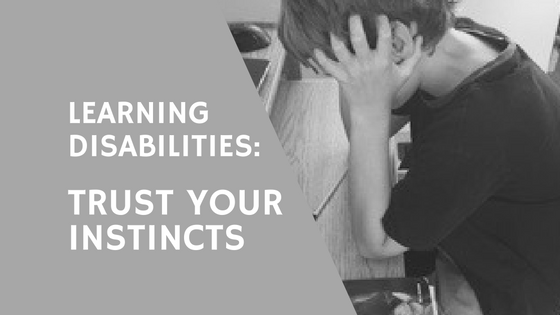Have you ever had “that feeling?” The one that just doesn’t sit very well when you see your child struggling to learn something new. You try to listen to the comments of others, “Don’t worry, it’s a boy thing!” “Remember, he is a December baby,” “I’m sure he will grow out of it,” but you know both in your head and in your heart, that something just isn’t right. Trust your instincts! You are probably beginning to realize that your child learns differently.

If you believe that your child is struggling, it is important to consult with your family doctor or pediatrician to rule out other medical issues that may be related to hearing or vision. Research shows that the early years (ages 3-6) set the base for competence and coping skills that will affect learning, behavior and health throughout one’s life (McCain, Mustard and Shanker 2007). This then suggests that early intervention is critical in order for children to receive the necessary services and supports they need for growth and development.
What is a learning disability?
A learning disability is neurological dysfunction, which interferes with the brain’s capacity to process information in the conventional manner and may co-exist with other conditions, including attention, behavioral and emotional disorders, sensory impairments or other medical conditions. Learning disabilities can take many forms, vary in severity and intensity that can affect how a person interprets, remembers, understands and expresses information. A learning disability is not a problem with intelligence or motivation; their brains are simply wired differently. Learning disabilities may affect academic performance (e.g., spelling, reading, listening, focusing, remembering and writing), social functioning, life skills (e.g., planning, organizing, predicting), and physical interaction with the world (e.g., balance, coordination, movement).
We know that learning is a lifelong process and children with LD can learn if given have the right skills and environments to support them. Some of these include ensuring your child receives:
- Consistent discipline
- Regular patterns
- Positive praise and encouragement
- A safe environment in which to practice social skills
- An opportunity for role play to prepare for new activities
- Supportive academic environments that accommodate and builds on your child’s areas of strengths and needs.
Most importantly, trust your instincts when it comes to your children. If you suspect that there is something to be worried about, consult your family doctor or pediatrician to explore the next steps to take. You’ll be so glad you did — for your own sake and the sake of your child.
This post was contributed by Janet Arnold. You can find more from Janet at Finding Solutions.
Share this Post

